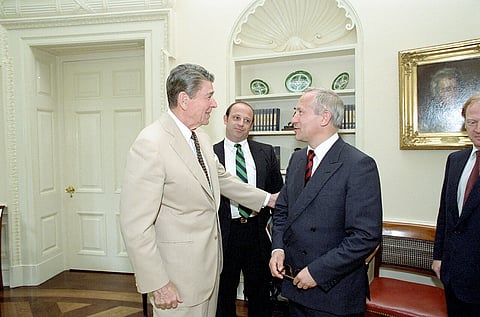

Oleg Gordievsky, a former Soviet KGB officer who became one of the Cold War’s most influential double agents by secretly aiding British intelligence, has died at his home in England. He was 86.
Gordievsky passed away on March 4 in Godalming, a quiet town southwest of London where he had lived under police protection since defecting from the Soviet Union in 1985. Authorities confirmed his death and stated they are not treating it as suspicious.
Historians regard Gordievsky as one of the most significant spies of the 20th century. His covert work in the 1980s provided critical intelligence that helped de-escalate nuclear tensions between the Soviet Union and the West, potentially averting a catastrophic conflict.
From KGB Officer to British Informant
Born in Moscow in 1938, Gordievsky joined the KGB in the early 1960s and served in various postings, including Copenhagen and London, where he eventually rose to become the KGB station chief. Like many Soviet agents, he grew disillusioned with the USSR after its brutal suppression of the Prague Spring freedom movement in 1968. By the early 1970s, he had been recruited by Britain’s MI6.
In his 1990 book, KGB: The Inside Story, co-authored with British intelligence historian Christopher Andrew, Gordievsky wrote that he came to believe “the Communist one-party state leads inexorably to intolerance, inhumanity, and the destruction of liberties.” He concluded that the best way to fight for democracy was to work for the West.
For over a decade, Gordievsky operated as a double agent, providing invaluable intelligence to both MI6 and MI5. His most critical contribution came in 1983, when he warned British handlers that Soviet leaders, gripped by paranoia over a potential Western surprise attack, were preparing a preemptive nuclear strike. This revelation led NATO to scale back its military exercise, Able Archer, and defuse the crisis.
A Narrow Escape and a Life in Exile
By 1985, Moscow had grown suspicious of Gordievsky. Facing imminent arrest, trial, and likely execution, he made a daring escape. Smuggled across the Finnish border in the trunk of a car, he eventually resettled in the UK.
His defection was hailed as a major victory for British intelligence. Then-Foreign Secretary Sir Geoffrey Howe described it as “a very substantial coup for our security forces.” Gordievsky was the highest-ranking Soviet spy to defect during the Cold War.
In 1984, he played a key role in shaping diplomatic relations between the UK and the Soviet Union. He briefed both Soviet leader Mikhail Gorbachev and British officials ahead of Gorbachev’s first visit to the UK, helping to ensure a successful meeting with Prime Minister Margaret Thatcher.
Legacy and Honors
Gordievsky’s intelligence work led to the expulsion of 25 Soviet agents operating undercover in the UK. In 2007, he was awarded the Companion of the Most Distinguished Order of St Michael and St George.
Despite his contributions, his defection came at a personal cost. His wife and daughters were held under 24-hour KGB surveillance for six years before being allowed to join him in England in 1991. In Russia, he was sentenced to death in absentia for treason.
Gordievsky spent his final years in Godalming, living under British protection.